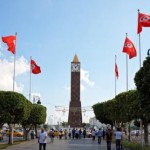The year 2014 has been commonly viewed as a very bad one for democracy, which it was. It was a year in which Russia responded to the democratic revolution in Ukraine by annexing Crimea, invading the eastern part of the country, and challenging the world order established after the Cold War. In 2014 China observed the 25th anniversary of the Tiananmen crackdown by keeping Nobel Peace Laureate Liu Xiaobo in prison and tightening repression against human rights defenders and the Tibetan and Uyghur minorities. In countries as diverse as Egypt, Thailand, Turkey, Nigeria, Hungary, Venezuela, and Azerbaijan the trends were all negative, as they were in Burma where the reform process that started in 2011 came to an end, and in the Middle East where the slaughter in Syria continued and the rise of the Islamic State posed an unparalleled new threat to the region and the world.
This is not the first time that the democratic prospect has seemed very bleak. In 1976, on the occasion of the bicentennial of the Declaration of Independence, Daniel Patrick Moynihan wrote that democracy “is where the world was, not where it is going.” Among the developments he was reacting to at the time were the U.S. defeat in Vietnam, the suspension of democracy in India, the imposition of military regimes in many Latin American countries, and the rise of violent African dictators like Idi Amin in Uganda.
Moynihan had no way of knowing that political changes taking place in Portugal and Spain at that very moment were launching an historic process that Samuel Huntington would later call “the third wave” of democratization, when the number of democracies in the world more than doubled and democracy came to be seen as the only legitimate form of government. As these changes began to unfold, the pessimism that Moynihan reflected soon gave way to a heady optimism, with many people assuming that the expansion of democracy would continue inexorably.
But of course we now know that the new optimism was no more grounded in reality than the old pessimism. Many third-wave transitions failed, autocrats became more adept at controlling democratic movements and advancing their own political agendas internationally, and the countries of the democratic West, which once seemed so triumphant, soon found themselves mired in financial and political crises and unable either to generate popular trust in democratic government or to project with confidence their own democratic values.
Might the current pessimism, therefore, also be excessive? Are we blind to emerging democratic possibilities that are not as apparent as the troubles that now assault us from all sides? No one can know for sure. But there are four reasons for thinking that democracy can yet rebound, perhaps not as dramatically as during the third wave, but with enough momentum to reverse the present sense of democratic decline.
The first of these reasons is that democracy has progressed against great odds in two critically important countries. In Indonesia, the world’s largest Muslim country, Joko Widodo, a reform-minded leader supported by a broad democratic civic movement, defeated a concerted effort by the militaristic old guard to roll back political change. Even more important was the victory of democracy in Tunisia, where the major political forces were able to overcome deep political and social divisions to build a consensus for a democratic constitution and to choose a new leadership in peaceful parliamentary and presidential elections. Unlike Indonesia, which has great influence in Southeast Asia, Tunisia is a relatively small country. But it is the birthplace of the Arab Spring, and the consolidation of democracy there will create a precedent for democracy in the Middle East, which was by-passed by the third wave. Moreover, not only is Tunisia the first Arab democracy, it also represents an alternative idea in a region that is now dominated ideologically by Islamic radicalism. If it can capture the imagination of intellectuals and young people, the impact of the transition in Tunisia could be far-reaching.
The second reason to be cautiously optimistic about democracy’s prospects is that a number of the leading autocracies today face their own severe crises. Russia is now reaping the harvest of its aggression in the form of a collapsing currency, rising inflation, massive capital flight, and shrinking foreign reserves, in addition to significant casualties from the war in Ukraine that the government – fearing a public backlash – has tried to conceal. These problems have now been compounded by the sharp drop in the price of oil and could threaten the survival of Putin’s regime. Other oil-based autocracies are also in trouble, notably Nicolas Maduro’s populist regime in Venezuela, where the economy began to implode even before the catastrophic fall in oil prices; and the Islamic dictatorship in Iran. Economic troubles in dictatorships are not necessarily a good thing, since the regimes could react by escalating international tensions and increasing repression. But they expose the vulnerability of such regimes, and they can sometimes lead to unexpected political openings.
The third reason is that the United States is beginning to recover from a period of isolationist withdrawal following the difficult wars in Iraq and Afghanistan. There is no way to know for sure if and to what extent the troubles of 2014 are tied to the vacuums created by the U.S. pullback. But growing popular support for renewed U.S. engagement, as reflected in the bipartisan agreement in the Congress to aid Ukraine, is certainly a reaction to those troubles. It isn’t clear yet if a new consensus will emerge favoring stronger U.S. leadership in the world, which is necessary for democratic progress internationally. But at least that is now a real possibility, and the long-awaited economic recovery after five years of recession is another factor that could bolster American influence abroad.
The fourth and final reason for hope is the sustained struggle of democratic movements in countries throughout the world for political and economic accountability, civic renewal, and democratic rights. The victory last February of the Euromaidan movement in Ukraine produced a harsh Russian reaction. But instead of retreating, the movement continued to push forward. If it succeeds in fighting corruption, reforming the economy, and building a new country based on the rule of law, it will help democracy not just in Ukraine but also in Russia and other countries in the region.
Even in some of the bleakest situations, such movements have shown relentless determination and persistence. The police cleared the streets after the Umbrella Revolution in Hong Kong, but the movement was not defeated. “We will be back,” read the banners the protesters unfurled as they prepared to leave. And as The Economist wrote, “How long before the youths of Beijing and Shanghai put forth demands of their own?” Such demands are also being put forth by the Cuban Civil Society Open Forum, which declared soon after the announcement on restoring U.S.-Cuban relations that it intended to “expand the role of civil society” and offer the Cuban people “a new narrative, tactics and strategy, and a new language” after more than five decades of totalitarianism.
Such movements will be heard from in the years ahead since they consist of activists who represent a new force in international politics: realistic in their goals and strategies, tech savvy and informed, and committed to staying the course in the fight for human rights, freedom of expression, and the rule of law. One of them is Rafael Marques de Morais, an Angolan journalist who has been threatened and tortured, and who will go on trial in March for reporting on official corruption and trafficking in blood diamonds. Speaking in memory of some of his slain colleagues, and also on behalf of journalists and human rights defenders throughout Africa, he extolled “the courage, the leadership, and the solidarity that are required to bring down the walls of fear, and with them the fear-mongers,” and pledged that “No politician, however strong and fearsome, will deter me from doing my job.”
Such activists know that they face a long and dangerous struggle, and that even if they succeed in removing a dictatorship, an even more difficult challenge will follow, which is building new institutions, subjecting powerful and corrupt interests to the rule of law, and getting democracy to work and produce real progress for all the people, not just for the elites. The fact that such activists persist in their work, without the benefit of any illusions, is the main reason we can be hopeful about the future. It is critical that we in the established democracies let them know, through meaningful words and actions, that they are not alone.

